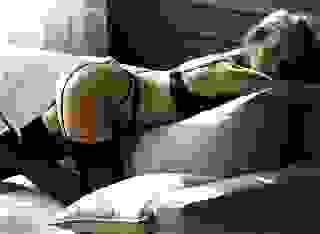Note: You can change font size, font face, and turn on dark mode by clicking the "A" icon tab in the Story Info Box.
You can temporarily switch back to a Classic Literotica® experience during our ongoing public Beta testing. Please consider leaving feedback on issues you experience or suggest improvements.
Click hereI looked at Sam; he looked at me.
"Did she say anything about..."
"Nope."
"Fuck."
"Well, shit, I was hoping he was here to help order dinner again."
"I can do that," a young commando type said, walking up to Deb's bike.
"Outstanding," Sam said. "I'm hungry. Let's go."
The soldier smiled, and we walked down the road until we found something that looked like a café. Our comrade walked in, sniffed the air and walked out.
"Not here," was all he said.
"Excellent!" Sam replied, smiling.
"You write movies, don't you Sam?"
"I do."
"The colonel hates movies. American movies."
"And you? By the way, do you have a name?"
The soldier stopped, seemed momentarily ashamed. "Ah, sorry, my name is Hasan. Pardon my rudeness."
Sam stopped, held out his hand, and Hasan took it.
"So, what about you? Like any American movies?"
"I do. Star Wars, and Serpico. And once when I was in London I saw a movie called Love Story. I cried, but I was much younger."
"I did too, and so was I."
"And you," Hasan said, looking at me, "you are a pilot. Do you fly big planes?"
"Yes, I suppose so."
"Like what, for instance?"
"Do you know the TriStar? The L-1011?"
"That is a very, very big airplane indeed," Hasan said, impressed. "My brother flies for Iran Air, the 747-SP. To Germany."
"Nice airplane."
"You think so? I will tell him you said so!" Hasan's nose was onto something good, and he led us down an alley until we stood before the greatest smelling restaurant in the history of civilization. Well, yes, we were hungry.
We went inside, Hasan ordered, and everyone inside stared at us, even the flies. More Persian Coca-Colas appeared, then dozens of kebabs and rounds of even more interesting salads, and we ate until we were about to burst. It was hot inside, though a little breeze stirred inside from time to time, enough to keep the flies moving, anyway, and Hasan proved an able conversationalist. Deb was off to Tehran, to the university hospital where the colonel's granddaughter had been taken. She would help get her ready for transport, to London, and her offer to arrange things on that end had been embraced. The colonel was very grateful, Hasan said, and he thought her a remarkable lady.
"She is," I said.
"She didn't tell us she was going," Sam added.
"The colonel asked this remain so. He did not want you to worry, and was unsure he would be allowed to arrange this. When all was approved, we left to come for the doctor."
"And you knew we were here?"
"Of course."
"When will she return?"
He shrugged. "I doubt tonight. Tomorrow, I would guess."
"And you will stay with us until then?"
"Of course. You are under the colonel's protection, but already there are some who want to interfere with your journey."
"I see."
"You do? Very good."
"Shall we have something sweet now, Hasan?"
"Yes. Why not?" He ordered several desserts, and more of the sludge-like coffee everyone seemed to adore.
Hasan knocked on my door at nine the next morning, and as Sam was already with him we set out looking for breakfast. He seemed perpetually cheerful, a happy soul, but then there was that uniform, for he was a soldier, and a well-connected one at that. Well-traveled, educated, articulate, my guess was that all was not as it seemed where he was concerned. He was more than likely a spy of some sort, and for some reason I wanted to know.
When we were seated and waiting for our breakfasts, I asked where he had gone to school, why he had gone into the Guards. He was dismissive, related that Deb, Dr Green, was to leave Tehran by midday, and that we would resume our journey tomorrow. He and some of the colonel's men would, he said, stay with us to the border -- "to insure your safe progress."
We heard the helicopter just after noon, and Sam and I watched it land behind the hotel. Deb and the colonel walked out of the beast as the rotors wound down, and Hasan walked with the colonel for a while; I assumed they talked about us, what they might do with us now that Deb had served her purpose, then the colonel joined us and asked us to lunch. Hasan had found a place worthy of a colonel, I guess, and we made our way to the place and went inside. There were about fifty guardsmen inside, most already seated, all very curious. We sat too, and tried to stifle our curiosity while the colonel and Hasan joined us.
We spent the afternoon in that restaurant, eating, drinking, asking questions, answering questions -- two Americans and a Brit trying to bridge a cultural divide so heavily infused with hate, and for so long, that finding common ground seemed impossible. But we were human beings. We shared things in common. Illness and the love we have for our children, and our grandchildren, for one. Respect for knowledge, for the experience of others. It was an unexpected day, and a good one. And I was sure I'd never be hungry ever again.
When we got back to the hotel Sam and I walked with her into my room; then, and only then, did we talk. She told us about Tehran, getting the colonel's granddaughter prepped and loaded on the IranAir flight to London. How nice everyone had been, very respectful, polite. Even the doctors in the hospital had shown deference, respect, and she was grateful for the experience. Hasan knocked on the door some time later and asked if we were okay, if we needed anything, and Sam told him we would be ready to go early in the morning.
"Where will you be heading?" Hasan asked. He seemed concerned. Preoccupied.
"Zahedan, then the crossing at Taftan."
He nodded formally. "Very good. I will see you in the morning."
"Shit!" Deb said. "Unmarried woman in man's room. Very insulting. I'd better get out of here."
"You've been in here two hours, Deb," Sam said.
"Yeah, and we've just been warned," she said as she got up to leave. "Oh, I'm hungry. Either of you want to..."
"I'll come with you," I said, not hungry but wanting to talk more with her.
Hasan was, of course, waiting right outside the door.
"Hasan!" I said, "The doctor is hungry. Shall we go?"
He smiled. "Of course."
We walked towards our alley diner from the first night and talked all the way. About the colonel's hospitality, the warmth of the Iranian people, that kind of thing.
"Are you ready to finish your ride tomorrow," Hasan said.
"What do you mean, Hasan?" Deb said. "We're nowhere near the end of our ride."
"Oh, I mean the end, in Iran," he said. "Surely you know, once you cross into Pakistan the road becomes very barren, very bleak."
"Have you been there many times?" I asked.
"No, just once, we drove there to purchase supplies, once, my father and I. It is a strange country, full of contradictions. Medieval, yet with nuclear technology. Very good schools, much confusion about Allah."
We went in the diner and Hasan ordered, then we sat and talked our way into the evening. Deb was reluctant to talk about events in Tehran, Hasan had zero interest in talking about life outside of Iran, so we spoke about life where he had grown up, the war with Iraq, what he saw as a looming, inevitable conflict with the Saudis and the Israelis, but he stopped himself there before we crossed an imaginary line imposed from on high. Deb and Hasan ate, I sipped tea, and after a few hours we walked back to the hotel, and she went off to bed as I said goodnight to Hasan.
We crossed into Pakistan two days later, and though Hasan and I never got a chance to talk again, I remember him well.
+++++
I don't know what I expected of Pakistan, southern Pakistan, anyway. The raw, barren landscape grew cooler after the passage of a cold front, the few trees we saw at the border crossing appeared reluctant transplants, and though we looked back at peeling portraits of the Ayatollah with few regrets, the road ahead looked ominously bleak. We were now more than 800 miles from our next border crossing, the hotly contested region between Lahore and Amritsar, in India's Punjab.
The time had slipped into October as well, and now we could see snow capped mountains to the north. We added a layer of underclothing as the air grew cooler and then, as we climbed the Sulaiman Mountains we found snow, not much but just enough. We slowed down as we wound through deep, rocky gorges, we huddled from the wind when the road crested ridge lines -- and then, after we descended into the Punjab -- we dropped onto an unexpectedly warm and green plain. We were warmer too, the weather almost tropical in places and more humid, yet we ran through sudden patches of semi-desert, and now there was a lot more traffic on the road. Cars, trucks, herds of cattle crossing between pastures, trucks loaded with bales of hay, and the road itself was different too -- what had once been four lanes was now a narrow strip of asphalt not quite two lanes wide, no shoulders, very little signage, with sand washing across the pavement when the wind picked up, obscuring lane markers and roadway edges from time to time. Camping was not advised, we learned: two many smugglers and way too many cobras roamed freely in the night.
As we approached Lahore we found ourselves immersed in civilization again. Freeways, heavy traffic, shopping centers -- planes, trains and automobiles of every description -- all seemingly deep within the pressing crush of millions of people. Sam easily found a hotel with secure parking, and we gladly retreated from this sudden modernity as we unloaded the bikes. Washing machines were located, coins found, and we set about housekeeping and washing layers of sweat-encrusted sand from our overheated bodies.
Pakistani food, if you've never imbibed, is similar to Indian but with nutmeg and a lot more yogurt, and many dishes feature eggplant. Needless to say, I could have stayed in Lahore for a month -- just eating. After Iran, this place was a revelation. We found a place to wash the bikes and were soon on hands and knees scrubbing everything we could, and hallelujah! we found a place to get new tires mounted. Oh yes, before I forget, that's another thing about motorcycles I'd forgotten completely about. Tires on cars easily last forty, even fifty thousand miles. Motorcycles? Three thousand is the norm when carrying heavy loads, five thousand with good quality tires, even more with premium quality brands like Michelin and Dunlop -- which we all had -- yet ours were all down to the tread warning bars. The man at the tire shop spoke passable English and got us hooked up with a good mechanic, and all our bikes' fluids and filters were changed. With new rubber on the pavement it was remarkable how much better the bikes handled, how much the ride improved, which was a good thing -- as I was now on the prowl for good looking restaurants night and day.
And 'praise the Lord!' -- there were telephones!
First thing I did after my first shower in five days was call the girls -- and they were in!
"Dad, where are you?"
"Lahore!"
"With a whore?"
"No, in Lahore, Pakistan!"
"Oh. Where's that?"
"I have no idea. What's up back there?"
"Rhea's doing great, the baby's fine."
"Is she there?"
"Not right now. Where are you off to next?"
India, I told her, was not at all far away, we'd be there within hours of leaving Lahore, then we had about nine hundred miles, call it three days, and we'd be in Kathmandu.
"Nepal, right? Isn't that near Everest?"
"Yup, sure is."
"This is unreal, Dad. I can't believe you all have done this. How's Mum holding up?"
"We couldn't have done it without her, Luce. She's just been a rock, like she's the glue that holds everything together."
"That's Mum! Oh, here's Rhea!"
And indeed, there she was. "John?! Where are you?"
"In Pakistan, near the Indian border."
"Good grief! Y'all are making great time. Where to next?"
"Nepal. We should have better phone service in India. Hope so, anyway. How are you?"
"Great. The baby's good, no problems, and the docs are great here."
"It's England, darlin', not Botswana."
She laughed, and the sound was like magic. "It's a long way from Munich, isn't it, John?"
"Yes, in so many ways."
"I miss you, you know?"
"I love you. More and more with each passing day. And I can't wait to see you."
"Oh, I'll bet you can't! How's Sam holding up?"
"Barely!"
"I bet!"
"How're you holding up, darlin'?"
"I'll make it. As long as you guys get back before the baby comes."
"Oh, we'll be back way before then."
"Promise?"
"I do. Because we will."
+++++
The further east we went, the more strange the roads. We were on something incongruously name The Grand Trunk Road, connecting Pakistan to India, Lahore and Amritsar, and traffic was hideous. Huge 'lorries' packed to overflowing flowed in both directions, and we'd pass hundreds at a time, yet we saw very few cars or buses on this stretch. Bizarre highway signage, truly incomprehensible, was everywhere -- while billboards were impossibly comic. Potholes that could swallow small cars came out of nowhere, causing us to swerve wildly, while just miles ahead the road was as good as any we'd been on. We crossed into India with little fanfare, passports and visas mere formalities quickly stamped, and then we were on our away, into India's western frontier. Our aim was to skirt the Himalayas all the way to Birgunj; there we'd head north and cross into Nepal and thread our way up to Kathmandu. We were in a race now, too, as we'd heard there's a road east of Kathmandu, the capital of Nepal. that crosses the Himalayas at relatively low altitude, but that closes when the snows come. Those snows came, we'd read, anytime from late September to early November, so we still had about a month to see about making it across. If we missed this window, we'd have to move further east, past Bhutan anyway, then work our way north on secondary roads, many unpaved, many through dense jungle. Nepal to Tibet offered it's own set of challenges, however, including snow, many stretches of unimproved roadway, and an indifferent, though possibly hostile Chinese reaction to our trip.
We rode through cities with names we'd never heard before, cultures jarringly new and unexpected, the disorientation we experienced was hard to ignore: Ludhiana, Ambala, Jagadhri, Bhimdatta...each a new world unto itself, each attractive, each repulsive, each almost otherworldly, each left me breathless with desire to know more, to want to live a life here, to know what it meant to grow up in tar-paper shacks and rambling hillside palaces. India was like that. Endless contradiction. Hope and despair thick in your every breath. You feel a glorious history, you can just make it out beneath layers of grinding poverty, yet all the contradictions become impossible to reconcile.
We stayed in hotels that were little more than hostels. Shared rooms, communal baths and toilets, because that's what India is, what it felt like to us, and while there might have been a Marriott or Hilton somewhere nearby -- why? Camping seemed unnecessarily offensive along this urban corridor too. When you pull into a town and hundreds of people stop and stare at you; when you pull into a gas station or up to a restaurant and dozens of people walk up to you and ask to simply reach and out touch your motorcycle? When grinding poverty meets wealth almost unimaginable? But I wanted to. I actually wanted to stop and sleep in a squatters encampment more than once. Untouchables, I heard Deb call them. When I saw these people, when I saw their daily lot, I felt for the first time in my life why Christ was so humble before the poor, why he resented wealth as much as he did.
Those moments were pivotal to me. I had never seen such simplicity of love within so much misery and suffering. Never had I felt so much indecision about the contours of my own life, my own expectation of material comfort, and because I did not understand how so much suffering could be tolerated by any just society I simply wanted to stop and try to come to some sort of accommodation. How could a child with multiple birth defects be left on a sidewalk to drink water from a gutter. How could this be? More to the point, how could I walk by this human being and not do something? How could hundreds of people walk by this child every few minutes and not reach out? I was lost in this world, and then a few minutes later I would see an act of love, an old blind woman picking up a starving child and giving him a rice cake, and in it's wake I could almost see a way through all these fleeting impulses.
A mother walked up to me with her child, and she looked to me almost a leper, her child in not much better shape, and she asked me in halting English if her son could sit on my motorcycle. It would make him so happy, she said, and she did not need to tell me he was sick, probably dying. I took him, held him, placed him on the seat and started the engine, let him honk the horn and flip switches to his little heart's content, then she took him and they disappeared into the flowing mass around us. What can you say in the face of such need? I felt helpless; Deb felt completely overwhelmed. Sam at times had to turn and hide his face -- and I could only wonder why.
India is humanity. The good, the bad, at least the part we experienced those October days. A book I had read years ago, in college, kept calling out to me, The Razor's Edge. The western fascination with the spiritual quest to India, then Hesse's Siddhartha, the The Beatles, Zeppelin and suddenly almost an entire generation was swept up this vast mystique. Yoga and transcendental meditation are a part of all our lives, all our cultures...so what was it about India that called out to us? Was it the old man starving to death in a ditch by the side the road, or the child carrying water to the old man?
We came at last to Raxaul, turned north on the AH42, the Tribhuvan Highway, heading for Birgunj, just across the border in Nepal. We passed the Shankaracharya Gate, the co-called Gateway to Nepal, a huge, white ornamental structure, and our world changed once again. Buses crammed to overflowing -- with mountains of luggage strapped to their roofs, cars driving on sidewalks while men with boxes on their heads walked in the road, traffic on the narrow two lane road moving at a crawl, asphalt giving way to mud, ancient trees arcing overhead -- the mud and this moving mass of humanity an amber, sun-dappled hallucination draped in lavender smog. Cool mountain breezes, deepening poverty everywhere around us...and then -- the foothills of the Himalayas. Tea plantations, hydroelectric power stations, red clay ranges covered with impossible foliage, homicidal drivers missing pedestrians by inches, a sign on the roadside warning of tigers in the area. Tigers? Homicidal drivers -- and tigers? Almost as bad as South Central Los Angeles, I told myself, but sixty miles and three hours later we rolled into Kathmandu, and by now we were beyond thoughts of other worlds. We had seen so much, experienced so much in the past week we were almost shell-shocked. Cultural overload, the bane of long distance travelers over the millennia, had finally caught me unawares; now all she had to do was drag me to the ground and sink her fangs into my jugulars.
We found a small inn on the banks of the Bagmati River, near the Pashupatinath Temple, the security of our machines no longer much on our minds. My room overlooked the river, and I could see the vast snow-capped range of the Himalayas to the north, calling me now from beyond the brown, worn window in my room. I looked around this room -- ancient timbers, brown and black with age, defined everything in sight: the walls, the floor, the sagging ceiling. Red quilts on the timber bed. Timber, old and dry, timber ready to surrender to time but called to stand sentinel beside weary travelers -- for how many centuries, I wondered. Timber too old and dry to care anymore, timber just like me.








